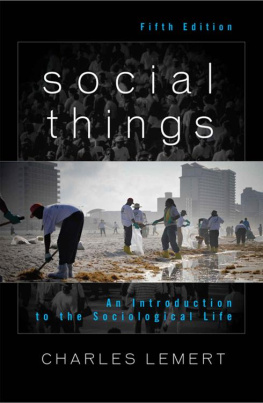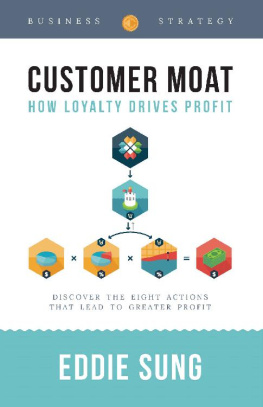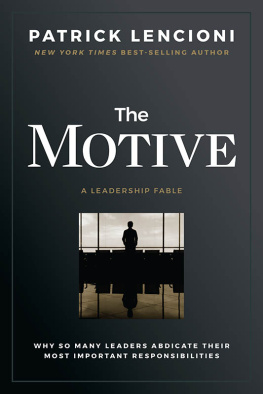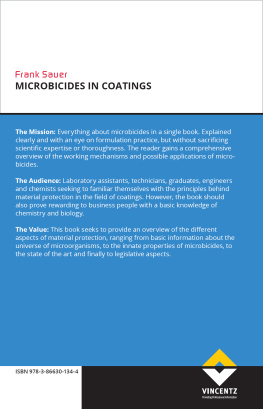Charles Sauer - Profit Motive; What Drives The Things We Do
Here you can read online Charles Sauer - Profit Motive; What Drives The Things We Do full text of the book (entire story) in english for free. Download pdf and epub, get meaning, cover and reviews about this ebook. year: 2018, genre: Business. Description of the work, (preface) as well as reviews are available. Best literature library LitArk.com created for fans of good reading and offers a wide selection of genres:
Romance novel
Science fiction
Adventure
Detective
Science
History
Home and family
Prose
Art
Politics
Computer
Non-fiction
Religion
Business
Children
Humor
Choose a favorite category and find really read worthwhile books. Enjoy immersion in the world of imagination, feel the emotions of the characters or learn something new for yourself, make an fascinating discovery.

- Book:Profit Motive; What Drives The Things We Do
- Author:
- Genre:
- Year:2018
- Rating:5 / 5
- Favourites:Add to favourites
- Your mark:
- 100
- 1
- 2
- 3
- 4
- 5
Profit Motive; What Drives The Things We Do: summary, description and annotation
We offer to read an annotation, description, summary or preface (depends on what the author of the book "Profit Motive; What Drives The Things We Do" wrote himself). If you haven't found the necessary information about the book — write in the comments, we will try to find it.
Profit Motive; What Drives The Things We Do — read online for free the complete book (whole text) full work
Below is the text of the book, divided by pages. System saving the place of the last page read, allows you to conveniently read the book "Profit Motive; What Drives The Things We Do" online for free, without having to search again every time where you left off. Put a bookmark, and you can go to the page where you finished reading at any time.
Font size:
Interval:
Bookmark:
Table of Contents
THANK YOU TO MY WIFE AND KIDS for their support during my writing of Profit Motive. It was both a time and mental commitment, and they were supportive and understanding through the entire process. Thanks to Nancy Sugihara, the editor, for her patience, thoroughness, and ideas that fully helped shape the book into a finished product.
And thank you also to the illustrator Max Espinoza for drawing Mr. Profit Man according to my idea to adapt a cartoon based on Fredrick Burr Oppers famous political cartoons of late nineteenth century industrialists. Oppers caricatures were intended to villainize the industrialists, but we wanted something different, and Mr. Espinoza pulled it off well. In our updated rendering of an Opper caricature, Profit Man doesnt seem lovable at first, but Max expertly allows Profit Man to appear more friendly as you get to know him throughout the book, and his trustworthiness and loyalty shine.

Photograph Max Taylor
Charles Sauer is an economist, policy specialist, and writer. He has spent time on Capitol Hill working for the Chairman of the Senate Finance Committee, and he has worked for a governor on tax, immigration, and labor issues; and was Deputy Legislative Director for an academic think tank focusing on tax, finance, and health care. Charles runs the Market Institute, is a founder of the Savings and Retirement Foundation, a CoDirector of the Inventors Project, and host of the Prosperity Caucus.
Charles is a frequent contributor to The Weekly Standard, a Washington Examiner contributor, and has written for Forbes, Investors Business Daily, Entrepreneur.com, The Washington Times, The Daily Caller, and numerous other publications. Additionally, Charles Sauer appears frequently on One America News as well as The Big Picture with Thom Hartmann, and the Thom Hartmann Radio Program.
In addition to his life in politics and writing, Charles enjoys spending time with his family. He is married to Andrea Sauer, the love of his life and the supporter that he credits for being able to freely pursue his dreams, and they have three beautiful daughters: Anna, Madonna, and Charlotte.
I am grateful to the following business leaders for engaging in the interviews I conducted for this book. They really help tell the story and even further inspired me in the writing of the manuscript. All information below is accurate according to the authors records.
Nicholas Buchanan, phone interview on September 23, 2015, with follow-up emails and phone calls
Sandra Bond Chapman, PhD, email interview, December 20, 2016, with follow-up emails and phone calls
Ron Devine, in person interview, December 5, 2016 with follow-up emails
Godwin Dixon, email interview, December 20, 2016 with follow-up phone calls and emails.
Thom Hartman, in person interview, October 7, 2016 with follow-up emails.
Doug Humphrey, in person interview, December 16, 2016 with follow-up emails
Jay Kempton, email interview, December 22, 2016 with follow-up emails and phone calls
Dave Mohel, phone interview, October 25, 2016 with follow-up emails and phone calls
Terry Neese, phone call interview, January 15, 2016 with follow-up emails and phone calls
Christina Norris, email interview, December 15, 2016 with follow-up emails.
Rev. Molly Simpson, United Methodist clergy, phone call interview, January 17, 2016 with follow up emails
Dr. Keith Smith, email interview, January 2, 2016 with follow-up emails and phone calls
Andrea Sauer, in person interview, October 2, 2017 with follow-up emails
LETS START OFF WITH A quick thought experiment. If an architect is getting paid to design a building and his company also produces metric fasteners, like screws and bolts, is the architect likely to plan for standard connectors or ones that are metric?
The answer is of course metric, at least if that architect values his job. The employee is motivated to make decisions that benefit his company, and the company is motivated to maximize profit. This little thought experiment is multiplied in our lives hundreds, if not thousands, of times each day, and when each of our decisions are all added together and aggregated, they shape our lives. The reason that people make decisions one way or another is based on their Profit Motives. Almost every decision that we make is based on this principle of our motivation to profit, whether we think we will gain a financial benefit or another kind of benefit. So if we can better understand the profit motives of others we can use this information to our advantage.
The goal of this book is to reveal the underlying motivations of the world around us. Most people would agree to the obvious statement that businesses are in business to profit, but what does that really mean? In this book we look at different decisions that businesses make from pricing to employment choices, and even how seeking long-term profit can mean making decisions that at the time appear contrary to capitalist principles.
However, while our understanding of decision-making for a for-profit business is important, this book also goes beyond this to explore how profit, or a valuable return, also drives decisions of nonprofit organizations, political movements, charities, churches, hospitals, think tanks, media, individuals, families, and the world around us. We need to ask why businesses or individuals make their decisions. We need to ask why certain people are in the news, why news sites run certain articles, or why businesses cultivate different cultures. Understanding the concept of Profit Motive helps provide the insight to answer these questions and provides a strong foundation to ask more questions.
Looking back, I realize that watching people I know struggle in the business world is what led me to write this book. I know plenty of people who have received top-notch educations but still fail to understand the world around them. Some of the reason is their lack of an inclusive business education. The schools they attended didnt teach much about selling, especially making sales with a focus on the person that they are selling to. But a major flaw of my friends thinking is that they underestimate the Profit Motive of others.
Many who dont grasp the nature of Profit Motive seem to believe that people are good, and that in general most people go about their lives making rational decisions free from other coercions. And they are then often surprised when someones goodness and making rational, smart decisions doesnt turn into business success. This is because business isnt about being good; business is about recognizing motivations and making sales. Businesses are motivated to profit. Furthermore, my friends and colleagues have often been motivated to do more good through their businesses than make a financial profit and are then surprised when the businesses dont develop as they thought they would.
It doesnt take a large investment of $1,000,000 to run into these problems; I speak to independent inventors all of the time who have invested a few hundred dollars into their idea and run into this same issue. An inventor may have solved a heinous problemlike the deaths of children left alone in overheated or freezing carsbut overlooks that in order for the idea to flourish somebody needs to buy the product for more than it would cost to manufacture it.
Watching these friends and their businesses flail around led me to look further into what makes others successful and examining the motivations behind their decisions. But it wasnt until I personally walked into this trap that I more fully understood the world around me.
Next pageFont size:
Interval:
Bookmark:
Similar books «Profit Motive; What Drives The Things We Do»
Look at similar books to Profit Motive; What Drives The Things We Do. We have selected literature similar in name and meaning in the hope of providing readers with more options to find new, interesting, not yet read works.
Discussion, reviews of the book Profit Motive; What Drives The Things We Do and just readers' own opinions. Leave your comments, write what you think about the work, its meaning or the main characters. Specify what exactly you liked and what you didn't like, and why you think so.










